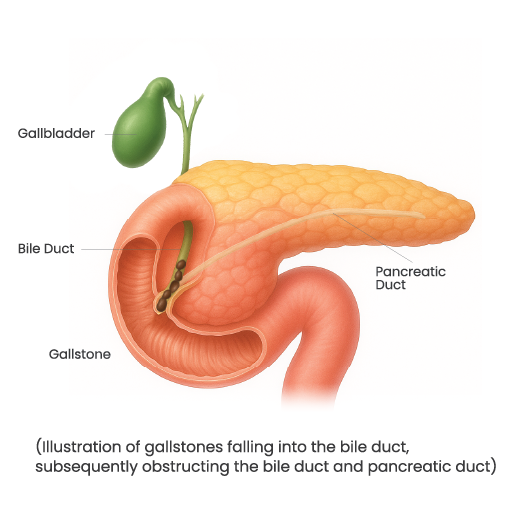Sudden, persistent severe upper abdominal pain accompanied by fever and vomiting may indicate acute pancreatitis. Dr. Ho Kit Man Carmen, a specialist in General Surgery at Chiron Medical, explains that acute pancreatitis typically lasts for several days. If not managed properly, it can lead to various complications, including sepsis, respiratory distress, organ failure, and disseminated intravascular coagulation, which can be fatal.
Dr. Ho points out that gallstone is one of the main causes for acute pancreatitis, as they can block the pancreatic duct, leading to inflammation and swelling of the pancreas. Additionally, long-term alcohol abuse can have direct effect on the pancreas, as well as elevating the blood lipid level; both can trigger pancreatitis. Other causes may include side effects from medications, abdominal trauma, viral infections, and autoimmune diseases.
The pancreas is located behind the stomach, so the symptoms of acute pancreatitis are similar to those of gastrointestinal diseases. Patients often mistaken it as stomach-ache, with discomfort that may radiate to the back. Therefore, diagnosing pancreatitis typically requires a series of tests, such as blood tests to check for amylase and lipase levels, or imaging studies like abdominal ultrasound or cross-sectional imaging (CT scan or MRI) to make the diagnosis and to look for any local complications.
After diagnosis, patient will be closely monitored and put on potent antibiotics and intravenous fluids as supportive measures. For gallstone-induced pancreatitis (biliary pancreatitis), MRCP is arranged to exclude stones in the common bile duct. If ductal stone(s) are detected, ERCP (endoscopic retrograde cholangiopancreatography) will be performed to remove the ductal stones with or without placement of a
plastic stent to relieve the biliary obstruction. Cholecystecomy will be performed when patient is stabilized to prevent recurrent events. For pancreatitis induced by chronic alcohol use or hyperlipidemia, patients will be advised to abstain from alcohol and have lipid level controlled by lipid lowering medications and diet restriction.
Dr. Ho advises that anyone experiencing related symptoms should seek medical attention for prompt diagnosis and subsequent management. Furthermore, recurrent attacks might result in chronic pancreatitis, pancreatic atrophy and fibrosis and potential endocrine or exocrine insufficiency. Pancreatic fibrosis and chronic inflammation may also lead to abnormal proliferation, increasing the risk of pancreatic cancer.
Updated: 2025-08
Please note that all medical health articles featured on our website have been reviewed by Chiron Medical doctors. The articles are for general information only and are not medical opinions nor should the contents be used to replace the need for personal consultation with a qualified health professional on the reader's medical condition.